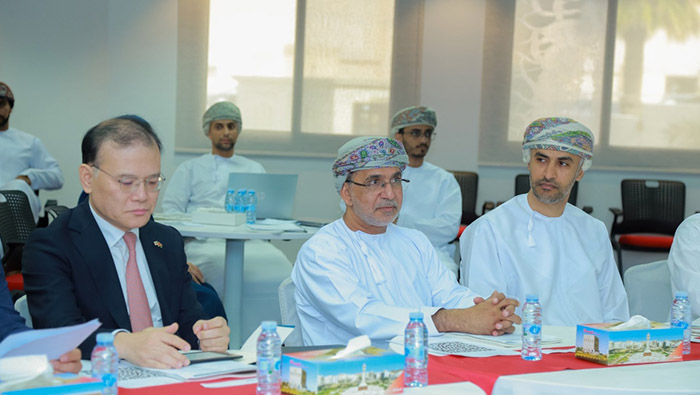
Muscat: A national early warning system for financial and economic crises will be established in the Sultanate of Oman. The joint project is being done in close cooperation between the Korea Development Institute (KDI) and Oman’s Tawazun programme.
The Tawazun programme is the National Programme for Fiscal Balance, created by the Ministry of Finance in light of the fiscal challenges, and given the uncertainty in the future of oil prices. The Medium Term Fiscal Plan (MTFP) for the years 2020-2024 was developed with an overarching objective of achieving fiscal balance in the medium term.
On Tuesday, the Ministry of Finance, in cooperation with the Ministry of Economy and Finance and the Korea Development Institute, held a coordination meeting to discuss the conclusion of a joint programme.
The meeting was co-chaired by Nasser bin Khamis Al Jashmi, Secretary General at the Ministry of Finance, and Dr Woong Seob Zhin, Former Governor of Financial Supervisory Service of Korea and senior advisor of the project, and was attended by senior officials from both the nations.
During the meeting, the results of the final study and recommendations regarding the establishment of the national early warning system for the Sultanate of Oman were presented.
A simulation and forecasting system model was presented to demonstrate the structure and components of the system, with financial and economic inputs. The design of a quantitative early warning system was also showcased ahead of the release of a user guide. The early warning system for financial and economic crises is a bilateral programme that was launched by the end of 2022 as part of the Korean Knowledge Sharing Programme (KSP).
The Korea Development Institute aims to transfer knowledge and experience in Korean development to partner countries in the field of macroeconomic policies and financial systems and has been working with Tawazun (National Programme for Fiscal Balance).
A number of relevant institutions participated in the meeting. They included representatives from the Ministry of Economy, the Capital Market Authority, the Central Bank of Oman, the National Centre for Statistics and Information, and the National Risk Register System.
In his remarks on the project, South Korean Ambassador Kim Kiejoo said: “I deeply appreciate the dedicated efforts of Tawazun and the Korea Development Institute, whose collaborative hard work has led to the successful conclusion of this project and the presentation of their innovative brainchild.”
The Ambassador said, “I am pleased to acknowledge the joint efforts of these two esteemed institutions, who have been working closely together since last November. Their strong collaboration builds on their remarkable professional achievements in the earlier KSP projects in 2008 and 2012, respectively.”
He added: “I would like to emphasise the profound significance of this project, highlighting its three key contributions: First and foremost, the Knowledge Sharing Programme (KSP) has contributed to deepening the partnership between our two countries, fostering policy dialogues and the emulation of best practices. Indeed, our two countries have enjoyed the already-strong economic and trade partnership since Korea and Oman established diplomatic relations in 1974.
“We are looking forward to the upcoming commemoration of the 50th anniversary of this robust bond of relations next year. I am proud that our collective achievements in our bilateral partnership are outstanding. Now, Korea has evolved into one of the major trade partners of Oman with bilateral trade reaching US$5.6 bn last year. “Our steadfast and future-oriented partnership extends across various sectors such as developing hydrogen economy and industry and transitioning towards net zero by 2050. As such, our two countries will remain mutually reliable partners in the years and decades to come.”
Ambassador Kim Kiejoo said: “Secondly, I am sure that the project would contribute to the achievement of economic benchmarks of the Sultanate of Oman and the delivery of the Oman Vision 2040. Notably, fiscal sustainability stands as one of the essential guidance strongly embedded within Vision 2040. I am also impressed with the stabilisation of financial performance of the Omani economy including the clearance of public debt in the amount of OMR 1.5bn and the accumulation of financial surplus of OMR656mn by the end of the first half of this year. I sincerely hope that the project would be conducive to greater coherence and cohesion of the financial landscape of the Sultanate, further advancing the goal of stability."
He said: “Last but not least, the global economy is undergoing serious fluctuation and pressing challenges at the cost of stability and wellbeing of people worldwide. In this context, sustaining financial stability is increasingly essential for the world economy. The establishment of early warning mechanisms would represent a pivotal policy intervention to effectively address the shared challenges of the world. Thus, the successful culmination of the project would also serve as an instrumental step towards exploring a collective platform, which would be of substantial benefit to the global economy.”